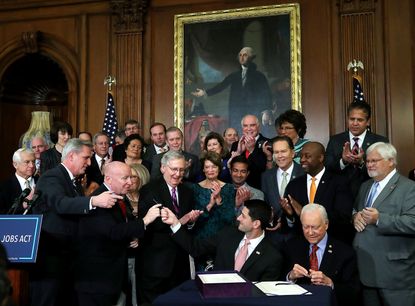In the 'grain glitch,' the GOP is reaping what it sowed
The GOP has spent years refusing to help Democrats fix ObamaCare. Do they really expect Democrats to help them fix their tax bill?


Predictable as a sunrise, Republicans have encountered the first major unintended consequence of a tax cut bill that was ill-considered to begin with and then hurried madly across the finish line. Wags are calling it the "grain glitch":
A late change to the legislation altered a deduction for United States production in a way that permitted farmers to deduct 20 percent of their total sales to cooperatives — agricultural organizations owned by groups of farmers that operate for the benefit of their members.This allows farmers to deeply reduce their tax bills, but it has caused an uproar among independent agriculture businesses that say they can no longer compete with cooperatives, since farmers would choose to sell to cooperatives to take advantage of the more generous tax break. [The New York Times]
In bills this long and complex, such errors are common even under the best of circumstances. Many more are bound to be discovered as wily accountants learn how to game the new system. The issue at hand is whether Democrats should cooperate with Republicans in fixing them. The backdrop is — stop me if you've heard this before — the looming midterm elections, in which Democrats are hoping to sweep to majority power in the House and maybe even the Senate.
Plus, why should they help Republicans — especially when Republicans never helped them in the Obama years?
Subscribe to The Week
Escape your echo chamber. Get the facts behind the news, plus analysis from multiple perspectives.

Sign up for The Week's Free Newsletters
From our morning news briefing to a weekly Good News Newsletter, get the best of The Week delivered directly to your inbox.
From our morning news briefing to a weekly Good News Newsletter, get the best of The Week delivered directly to your inbox.
The dispute carries echoes of the partisan grudge match that followed passage of the Affordable Care Act, when fuming Republicans refused to entertain fixes to the health law, focusing instead on numerous failed efforts to repeal it. The ACA process was much lengthier and more transparent than the writing of the tax bill, but both pieces of legislation ended up passing along party lines. [The Washington Post]
Axios reporter Caitlin Owens gathered various official Republican opinions on why this episode isn't analogous to the fight over ObamaCare. "Their answers were all over the map — everything from 'that was different' to 'we should fix both' to memory loss," she reports.
Of particular interest is the curious contention that wholesale opposition to fixing any aspect of the Affordable Care Act comes down to a question of ideology. I'm going to put the best possible spin on this interpretation. These Republicans are saying that one shouldn't feel obliged to clean up a mess that is the direct result of your opponents' misguided beliefs. For instance, GOP Sen. Joni Ernst of Iowa: "Republicans acknowledge [the tax law is] not working the way it was originally intended. Democrats have never acknowledged that ObamaCare failed."
In that light, let's revisit the absurdist drama over one of ObamaCare's technical glitches — in this case, the ambiguity created by its leftover legislative verbiage "Exchange established by the State," which some enterprising legal jackals turned into a case that made it all the way to the Supreme Court. Did the authors of the Affordable Care Act really intend for its premium support to flow only through insurance exchanges created by states? No one said so at the time. And no one — not even the law's most maniacal opponents — even considered the possibility until several years after the obsessively publicly debated law was enacted. (The dispositive tell, for my money, was the failure of even one red state governor with presidential aspirations to come forward and declare that "I knew it all along — which is why I made the difficult decision not to set up an exchange in my state!")
Resolved by a 6-3 Supreme Court opinion in 2015, this effort to sabotage the ACA through the courts was an act of astonishing bad faith. I seriously doubt any of its adherents, including the late Antonin Scalia (whose dissent characteristically harrumphed about "plain meaning" of words while a majority of the court rightly decided that the government's intent was plainly obvious) truly believed the BS they were peddling.
Yet today they plead for commonsense and cooperation.
As it happens, I think Democrats should cooperate on this issue — but not without a price. Republicans have been behaving terribly for the last eight years without paying much of one. Now's a good time to start.
Create an account with the same email registered to your subscription to unlock access.
Sign up for Today's Best Articles in your inbox
A free daily email with the biggest news stories of the day – and the best features from TheWeek.com
Scott Galupo is a freelance writer living in Virginia. In addition to The Week, he blogs for U.S. News and reviews live music for The Washington Post. He was formerly a senior contributor to the American Conservative and staff writer for The Washington Times. He was also an aide to Rep. John Boehner. He lives with his wife and two children and writes about politics to support his guitar habit.
-
 Solo travel: the 'ultimate indulgence in 2024'
Solo travel: the 'ultimate indulgence in 2024'The Week Recommends Why more of us are choosing to go on holiday on our own
By Adrienne Wyper, The Week UK Published
-
 'Stormy Monday for Don'
'Stormy Monday for Don'Today's Newspapers A roundup of the headlines from the US front pages
By The Week Staff Published
-
 6 queer poets to read whenever but especially now
6 queer poets to read whenever but especially nowThe Week Recommends April is National Poetry Month
By Scott Hocker, The Week US Published
-
 Arizona court reinstates 1864 abortion ban
Arizona court reinstates 1864 abortion banSpeed Read The law makes all abortions illegal in the state except to save the mother's life
By Rafi Schwartz, The Week US Published
-
 Trump, billions richer, is selling Bibles
Trump, billions richer, is selling BiblesSpeed Read The former president is hawking a $60 "God Bless the USA Bible"
By Peter Weber, The Week US Published
-
 The debate about Biden's age and mental fitness
The debate about Biden's age and mental fitnessIn Depth Some critics argue Biden is too old to run again. Does the argument have merit?
By Grayson Quay Published
-
 How would a second Trump presidency affect Britain?
How would a second Trump presidency affect Britain?Today's Big Question Re-election of Republican frontrunner could threaten UK security, warns former head of secret service
By Harriet Marsden, The Week UK Published
-
 'Rwanda plan is less a deterrent and more a bluff'
'Rwanda plan is less a deterrent and more a bluff'Instant Opinion Opinion, comment and editorials of the day
By The Week UK Published
-
 Henry Kissinger dies aged 100: a complicated legacy?
Henry Kissinger dies aged 100: a complicated legacy?Talking Point Top US diplomat and Nobel Peace Prize winner remembered as both foreign policy genius and war criminal
By Harriet Marsden, The Week UK Last updated
-
 Trump’s rhetoric: a shift to 'straight-up Nazi talk'
Trump’s rhetoric: a shift to 'straight-up Nazi talk'Why everyone's talking about Would-be president's sinister language is backed by an incendiary policy agenda, say commentators
By The Week UK Published
-
 More covfefe: is the world ready for a second Donald Trump presidency?
More covfefe: is the world ready for a second Donald Trump presidency?Today's Big Question Republican's re-election would be a 'nightmare' scenario for Europe, Ukraine and the West
By Sorcha Bradley, The Week UK Published